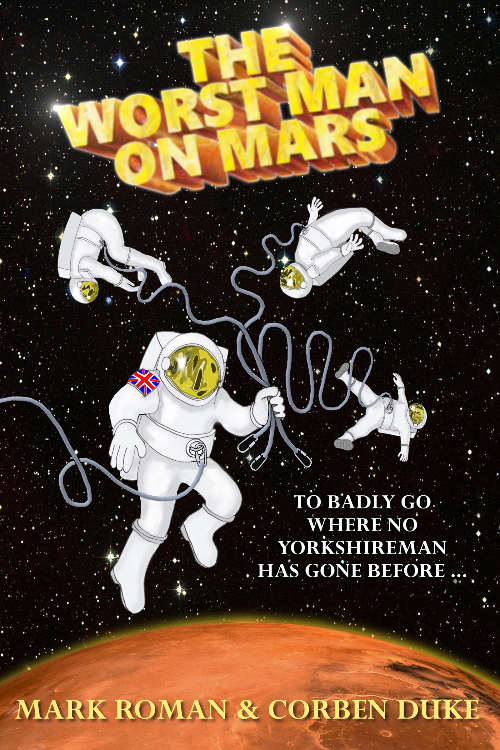Interview with Mark Roman
Author of The Worst Man on Mars
Mark Roman has been a research scientist for longer than he can remember, not that he can remember much these days. Memories of his heyday are a little vague – if indeed he ever had one. Nowadays, he just keeps dropping things: files, staplers, cups of tea, test tubes of biohazards. His colleagues keep showing him the door, but he’s not sure why they do this as it looks the same as it’s always done. He expects it’ll be time to retire soon, possibly when they disable his entry card.
Co-author Corben Duke has already experienced the retirement process and now lives a life of almost total inactivity. He used to be an architect – one of the best, he’ll tell you – although, when asked, he can’t remember a single building he designed. It doesn’t matter; most will have collapsed by now.
Together, they’ve been writing humorous science fiction stories for longer than either can remember. It’s a form of therapy, or so they say. It has done wonders for them, although less so for their intrepid readers.
Buy this book
How would you describe The Worst Man on Mars to a new reader?
- It does what it says on the tin: it’s a book about Mars, and the worst man on it. A quirky science fiction comedy. You can think of it as a cross between "The Martian" and "Red Dwarf", although we prefer to think of it as a cross between "Hamlet" and Proust’s "Remembrance of Things Past, Volumes 1 to 7". It tells the true story of Britain’s first crewed mission to Mars. Obviously, this true story hasn’t happened yet. But it will; and will be exactly the way we tell it. Well, perhaps 1% the way we tell it. Or less.
It has some useless robots in it, some useless humans, and some useless aliens – a tough call telling which are the more inept. And there are some great chapter illustrations by co-author Corben Duke, and a terrific map at the front. You surely can’t ask for more.
What was the inspiration behind The Worst Man on Mars?
- The failed Beagle 2 mission to Mars. If there’s one thing we Brits are good at, it’s failure. So, a British crewed mission to Mars would be doomed from the off. We set out to describe such a mission. And probably failed.
Which authors do you admire? How have they influenced your writing style?
- Brian Pimple, Sheila Coalscuttle, Imogen Spittle – they’re some of our favourites. Never heard of them? That’s because they’re failures and no publisher would dream of inflicting their work on the public. But that’s the point. You see, even though their books are utter tosh they never give up, they just keep on writing. And writing. We love that about them. Whenever we need motivation, we pick a Pimple off the shelf, or one of Coalscuttle’s romantic zombie thrillers, and it reminds us that even though things might seem bad, they could be a whole lot worse.
Can you tell us a little about the locations in the book?
- Ooh, that’s an easy one. Mars is one of the craggiest, dustiest and stoniest places in the Universe. Imagine a clay tennis court without the net and white lines, and without any players. Now think of it covered in red and brown rocks of different sizes. If you’ve pictured it correctly, you will understand why Mars is such a terrible place for a tennis match. Trust us, we’ve researched this thoroughly.
What advice would you give to aspiring authors? How would you advise a new author about traditional publishing versus self publishing?
- First, we’d advise them to buy Duke & Roman’s “How to write a book about writing a book and make a million bucks”, available from the authors for just $143. If they didn’t fall for that one, we’d try to enrol them in our course “So you want to be a successful Author?” – 6 online lessons for 120 bucks. And if that didn’t work, we’d most likely tell them they were wasting their time and suggest they give up. As for the question of traditional publishing versus self publishing, there’s no way we’d get that far into the conversation.
What's your writing process?
- We live 100 miles apart and have never met in person, which means fighting over the keyboard has never been an issue. We collaborate electronically. One of us will have an idea and e-mail it to the other, who will promptly reject it. If he then comes up with a counter-idea, he will fire it back, and it will, in turn, also get trashed. And so it goes on, until some fragments actually survive this brutal process and go on to make up a part of the final story.
Which character in The Worst Man on Mars has had the greatest impact on readers?
- The vacuum-cleaning droid, Disa, seems to have split opinion – although it would be a spoiler to reveal why. Also, the thuggish commander, Flint Dugdale, has his fans and his detractors. He is a pretty awful person, it must be admitted, yet in some ways quite the hero.
If The Worst Man on Mars were to be adapted for TV or film, who would you see in the lead role? Who did you have in your mind’s eye when you wrote him/her?
- Hmm … interesting question. Let’s see, we’d need someone large and loud, someone who likes beer … lots of beer. Perhaps Homer Simpson? Nah, far too sensitive.
How have readers responded to The Worst Man on Mars?
- It’s been a mixed response. Some have really liked it, which is nice, while others have marched on our homes in angry mobs carrying flaming torches, which is rather dispiriting – and inconvenient when one wants to go out and buy a paper. The Booker Prize committee have yet to read it.
What is your latest project?
- We have recently released a collection of humorous sci-fi stories, called "Sci-Fi Shorts". It’s an assortment of quirky tales of humans and aliens, and human aliens, and alien humans, and the end of the world. Stuff like that.
Synopsis
Hero. Legend. Role model. He’s none of those.
Flint Dugdale, blunt Yorkshireman and reality TV show winner, has used his large frame and ‘persuasive personality’ to take charge of Britain’s first mission to Mars.
Little does he know that the base – built by an advance party of incompetent robots – is not quite finished and has no food, water or doors. Worse, the ship’s scanners are picking up strange signals from the surface.
There is life down there. But will it be pleased to see him?

